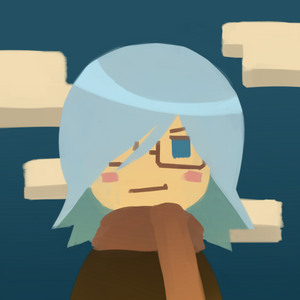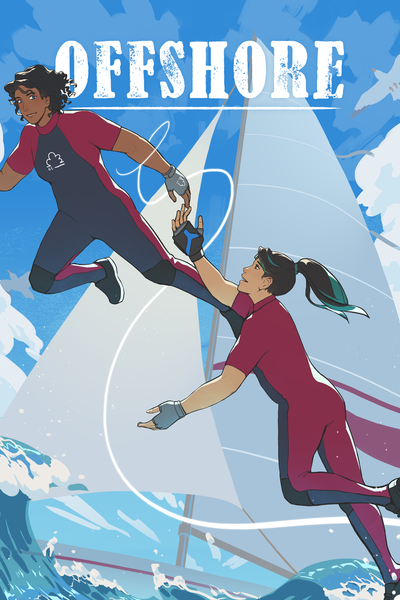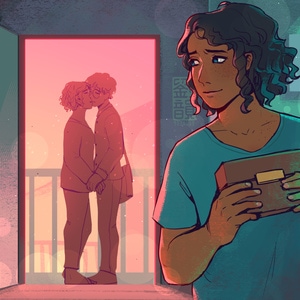Jinai had, for at least half a year, been aware of speculative whispers among the fans about the nature of her relationship with her teammate. No doubt that their generosity with affectionate gestures, even in front of cameras, had fuelled those whispers.
“Are they dating?” “Are they in love?” “Are they hinting that they could be?” She had never been able to stomach these questions—not when that ache still screamed, still coloured every corner, every time she thought of her old future. Traces of old plans lingered like silhouettes in the streetlights after dark, on the staircase landing, on the gift magnets she hadn’t had the heart to discard.
Salmon salad, he always liked the way I made it. What if—
“Stop living in my head!” she growled, stabbing at her salad dinner. But there wasn’t much she could do against the relentless habit of her mind, reaching for what she had spent four years building, and had crumbled in a single day.
Josa Takajo had gentle eyes and short, wavy brown hair. Many a sleepless night poring over a textbook had given him the golden horn-rimmed glasses he always wore, always slipping off his nose. He seemed to attract excellent grades and publications, and had recently passed the bar under the Helfi Judiciary when a firm in the mountain capital of Hecheng had offered him a contract of one year.
They had argued about that, many nights in a row.
“It’s just four hours by train,” he had said, the closest to shouting he had ever come. “You could take it back here twice a week, couldn’t you?”
“You want me spending sixteen hours a week on the train?” Jinai had snapped back. “Would you do that?”
It had been far from Josa’s only option, but the prospect of work in the capital city had held a magical sway over him that even Jinai’s pleadings had done little to erode. Like a bullet with a predetermined trajectory, he had already decided to leave. “Just one year,” he had said. “Then we’ll talk again and decide how to move forward.” He had tried to smile, perhaps for her sake. “Maybe it’ll turn out the city life isn’t for me.”
Just months prior, Jinai had found herself in the position of outing her beloved teammate, Oojima Kaori, to Cloud Connectors. She’d caught him, on multiple occasions, trying to watch her in the changing rooms—and that had been enough; the corporation had summarily dropped him. Just like that, those days of seaside banter, those years of shared ordeals, had disappeared. But forever she would hear the occasional whispers about how she had destroyed a decorated sportsman’s career—tarnished him just to spite his golden lustre.
That same month, the manager Mr. Sienyang had introduced her to his replacement in a company office boardroom. She remembered the nervous greeting of that new sailor, whom the manager had introduced as Liu Anqien, under those neutral thread lights. None of their one year’s experience had shown on their face as they had rambled out a self-introduction.
“…and I take care of plants in my free time. Nice to meet you!”
She had chirped out a reflexive welcome, still catching up to everything they had said.
“Mx Liu terminated their studies to take this position,” Telaki had whispered in the office lobby. “They could probably use your patience.” She had nodded. No doubt that Cloud Connectors had forced their hand. But she hadn’t asked back then.
Going through the motions of building their rapport on deck, their first weeks of sailing had been awkward, to say the least. Just three years younger than Jinai, but five years less experienced, Anqien had been more than a little starstruck. The better Weaver of the two, Telaki had put them at the helm, but at every turn and every call they had looked to their teammate to sign off on their decisions.
Everywhere they had wandered, between those cliffs, Jinai had seen them against the shadow of that terrible man who had come before. She had spent much of that first month as their mentor, patiently explaining simple wisdoms their university coaches had never thought to share. Always take the long tack first. Watch a puff for a while to tell which way it’s going.
But in the fold of the Cloudlanders, Anqien had learned fast, the initial awe thawing away as the air had warmed through the last of winter. And more than that, they had won Jinai over—caring so much about all they did, and asking about her life outside sailing. Not long after, in a rant over dinner and drinks at Konoma’s, she had disclosed the cause of their recruitment. She had never seen them so mortified.
When the matter of Josa's new job had appeared, Anqien had been her second confidante, after a frustratingly blasé Telaki.
“He’ll come around if he still cares enough,” they had said. “If he won’t make that sacrifice to make it work…he’s probably not worth the time.”
Anqien had been right, of course, but Jinai had been deep enough in the mire of denial that she had only politely nodded, and insisted, in her heart, that she had the drive and ambition to turn things around for both of them.
For the next months, Jinai and Josa had seen each other once a weekend, if that much. Sometimes she had commuted to his city; sometimes, but less, he had come back to hers. Inevitably, those meetings had become separated by two weeks, then three.
Josa had continued to be as mild and joyful as he always had, with those eyes that effortlessly lit her heart, even while she had worked to the bone to make up for Anqien’s inexperience. Six months in, the gaps had widened to a month. We’re both just so busy, you know? The excuses had made sense at the time.
As spring had peaked all rainy and warm, the Cloudlanders had clawed into second place in the Niro-Helfi Race, and second again in the Cross-Helfi Race. For what had been Anqien’s first international season, those results had been as admirable as any.
Meanwhile Jinai and Josa had passed the one-year mark, with a filogram message from the latter announcing he had netted a full partnership with the national judiciary, “and congratulations on second place!”
Perhaps she would have caught it if she had been paying attention: the tick of the clock as they had entered this new period of never meeting. There had been filograms, of “how are you”s and “I’m fine”s and “moving up in the firm”s—and so much numbing silence between. By then, cynicism had begun to pare Jinai’s hope away. It’s probably for the best, she had thought. May as well focus on the next trophy instead of a boyfriend who’s never around.
There’ll be time to chat when he decides he wants to.
The efforts to explain the gaps away, to shelve the impending heartbreak, could never have prepared her for how it had happened.
Come the next year, she and Anqien had both sunk hundreds of days of toil into the next international season. That agonising work had brought them a hair’s breadth from the win—starting the final leg in pole position. But there in the sun, taking their favoured route through the Sunken City, they had hit a reef and tipped on their side to hit the water, in one of the most widely-televised accidents of the decade. Then it had been game over for their title run: though they had recovered within two minutes, those minutes had made all the difference.
Second place again. Minutes had become years. Jinai had stood on the podium with the past half-decade on her shoulders—applauding the Mirages, steeling her face against any show of emotion less pleasant than sportsmanlike respect. But Anqien’s every gesture had telegraphed joy—from the way they had bowed to the audience with the silver medal looped around their neck, to the lift of their chin as the lights and confetti had rained upon the podium.
A month later, Josa had written in via filogram, asking to meet somewhere that wasn’t their homes.
Some little part of Jinai had known there could only be one reason, so she had chosen a place far from Wulien—an hour’s train journey northwest of the city, in a provincial town called Siajing.
Seeing him at the door of the nameless, decrepit restaurant, half a year after their last face-to-face meeting, had filled her with an incomprehensible bittersweetness. He had grown out a moustache and goatee, and his hair had been cropped and combed back, a proper professional’s coif, fit for the high court. There had been dark rings around his smiling, bespectacled eyes, and that gentle look had in that moment—as always—made her weak with longing and joy.
They had met four years ago, in the courtyards of shophouses in Ni’an, drinking together, then kissing under the trees, and they had bought the apartment together—always with his eye on the future, this one.
She was there again, in the doorway of that nameless restaurant that served only pies and dumplings, under the golden lamplight.
“Jinai, you know I love you, so much,” Josa said, and though his arms briefly moved to embrace her, he quickly snatched them away, tucking them behind his back with a clearing of his throat. “But I think it’s only fair, to both of us, to move on from each other.”
Jinai froze. She had rehearsed this scene so many times in her mind, but never had it looked like this. “I love you too,” the reply slipped through her lips, listless and choked and far too late.
She sat down opposite him, tear-blinded, and over a plate of dumplings—pork with sweet sauce—her favourite, of course he still remembered—he took the pains to admit that he had been seeing someone else for the past two months, and that it had killed him to persist with that double life without telling her. And so this was what today was about. He picked up a dumpling, moving as if to feed her, then ate it himself.
“I’m sorry,” he said, eyes red. “I’m very proud of you, doing so well at the NHR. You’ve always been so talented.”
Through the glass windows that looked over the nondescript plains, the sky was turning purplish grey, the silhouettes of trees swaying in the late spring cool.
She swallowed, trying to remember how to speak. “So…are you coming back to get your stuff from mine?”
He scratched his neck, brow furrowing. “I…forgot I had stuff there. You can sell it. Or donate it.”
Josa stood from the table after ten minutes of pristine, snowy silence between them. “I must catch the train or I’ll be late for work tomorrow,” he said, pushing the plate with its two remaining pork dumplings to her. He patted her shoulder twice. “Take care, alright?”
She finished them up alone and curled up in the chair, and cried till the place closed and the poor sod locking up offered her the storeroom for the night.
Nothing had felt real for almost a week. It had been enough to dread their parting. But they had parted—she had now realised—because he had found someone he wanted more, someone easier to reach, and had been living a life without Jinai in the picture long before she had even started to think of letting go.
She had taken all his valuables—a typewriter, a case of jewellery—to the pawn shop, and the rest of it to the homeless shelter on Garden Street or the curios store in the next ward—clothes, stationery, bicycle, a music box with a ballerina that still twinkled and danced.
The first person she had told had been Anqien, mainly because her absence at training that week had prompted a few worried filograms asking if she was alright. That had been the first time she’d invited them to her apartment, frantically apologising for the mess and taking them to the noodle stand for dinner instead of mustering up the will to cook. That had been the first time she had sobbed into their shoulder, fingers digging into their arms.
Anqien had started bringing her meals, despite her protests—they weren’t one to insist but in this case they had made an exception, putting them in her cooler the next time they had visited. “You really don’t have to,” she had said.
“No, I do,” they had replied, face set with an earnestness she only ever saw when they were at the helm. “Forgive me for being selfish, but if you stop eating properly then we can’t sail together, and sailing together is one of my favourite things in the world.”
Before Jinai had finished up her chicken curry rice, tears had begun to spill down her face—the stinging kind, which had forced her to push her dinner aside in favour of wiping her eyes. “Look at your teammate now!” she had laughed, shoveling the rest of her rice down.
“My teammate is a badass,” they had replied. “I’ve never gone through what you’re going through, and I don’t think I ever could.”
She had decided, after that turn of events and four missed training sessions in a row, that she would call her retirement after the next Niro-Helfi Race. Among the fans and the company, she had awakened a furor—and amid that, private outpourings of gratitude.
“I understand completely, but also, I’m devastated,” had been Anqien’s honest admission at Konoma’s that evening.
“I’m not gonna leave you high and dry,” she had told them, but even then there had been a bitterness to knowing their relationship would change irrevocably, too.
“Well, then, we’re gonna have to give that next NHR everything we’ve got, yeah?”
“More than we ever have,” she had agreed.
“Gonna work me to the death,” they had said, sticking out their tongue, and she had laughed back, ruffling their hair.
Jinai smiled down at her dinner, the sight distorted by tears. Long gone we’re the days when Anqien would ask after her advice with every turn of the helm, as if her opinion counted more than their own. After all, they had held her while she had cried. They had watched her starve herself, and brought her dinner for weeks. They had met her eyes a thousand times and instantly known what she’d been thinking.
And when Anqien had flirted back today, Jinai had felt something.
“Oh, who am I kidding?” she shouted, swiping the back of her wrist over her wet eyes. “I’m still crying over my ex, for fuck's sake.”











Comments (0)
See all